Jordan B. Cooper's Blog, page 47
December 4, 2014
One and a Half Advent Sermons
Okay, it’s really two sermons, but the one from Wednesday night is under 10 minutes.
First Sunday in Advent (Isaiah 64:1–9, 1 Corinthians 1:3–9, Mark 11:1–10):
Advent Midweek Service (Gen. 25:21-26, Rom. 9:10-16, Luke 1:39-45):
December 3, 2014
Why Does God Come to Us in Bread and Wine?

Not the picture I refer to in the talk. See here for that.
Today, I have been asked to give a short message at a “convocation” here at Concordia University St. Paul. I believe I am one of some 8 panelists. We will each be talking about an illustration of our choice from the Saint John’s Bible, which the school is hosting for this year. Here is what I plan on saying. Prayers are appreciated:
I have had some inspirational thoughts about the truths contained in the Bible lately. Admittedly, that is probably why this simple and humble illustration impressed itself upon me – not so much because it overwhelmed me with its artistic value, but because these days I have had the sacraments of the Christian Church, its “holy mysteries” – Baptism and the Lord’s Supper (pictured here) – on my mind.
Before I talk about them specifically, a question for you (which I promise will show its relevance later on): What does the Bible tells us is the first thing that almost all angels say when they appear?
That’s right: “Fear not”. Evidently, what every angel must learn in their Angels 101 class. For in their presence, sinful man’s natural response is one of fear. Terror of the Holy.
And how much more so with God Almighty Himself…. His Presence, it seems, is utterly terrifying. For the Scriptures reveal to us that when we are confronted with Him and His goodness we realize that we are not good…. “Woe to me!” the prophet Isaiah cried. “I am ruined! For I am a man of unclean lips, and I live among a people of unclean lips, and my eyes have seen the King, the LORD Almighty.”
But this is not the end of the story. For God deigns to visit those terrified by their unholiness with His gracious Presence….
First, He comes as an infant – an infant! – taking on human flesh en route to His goal of the cross. As an old Christmas hymn puts it: “Nails, spear, shall pierce Him though, the cross be born, for me, for you. Hail! Hail! The Word made flesh, the Babe, the Son of Mary”. He does not frighten us when He comes, nor as He grows from childhood to adulthood… His appearance does not overwhelm us, but is actually one that is humble, simple, and without any fanfare… The prophet Isaiah again: “He had no beauty or majesty to attract us to him, nothing in his appearance that we should desire him”…
Second, the same is true for how he delivers the gifts won at the cross for us. Simple and humble words. Simple and humble water. Simple and humble bread and wine. Why? Perhaps this: that He may not terrify us utterly – that we would run from His Glorious Presence. Rather, He makes Himself accessible to us poor sinners, giving us – in the most tender, loving, and intimate way – His very self in these simple and humble forms. The Lord’s Supper is the crown of this giving:
Take and eat, this is my body, which is given for you. Take and drink of it, all of you, this is the cup of the new and eternal testament in my blood, which is poured out for you and for many for the forgiveness of sins.
…Here, His children receive the fruits of the cross, where He exchanged His perfection for our sin, His death for our life… that we might be His own.
In truth, those inspired thoughts – about the humble and simple forms God uses to reach us – were not from me. It is actually what the great Reformer of the Christian Church, Martin Luther, said 500 years ago. Of God’s working in this way, he says: “Who can be terrified by these pleasing methods, and wouldn’t rather delight in them with all his heart?” Through these, Luther writes, he is “forgiving sin, cleansing from sin, removing death, bestowing grace and eternal life”.
All this said, it is not that these simple and humble forms make terror of the Holy One inconceivable. In the New Testament, Paul writes that some – perhaps not impressed with the humble and simple forms of bread and wine veiling God’s majesty – eat and drink without discerning the body, thereby eating and drinking judgment on themselves… they are “guilty concerning the body and blood of the Lord”. Here, the Lord even chose to strike some of His people down.
It seems a God who comes simply and humbly, like a Lamb – and our sacrificial Lamb, slain for our sins – is perhaps easier to love but also easier to scorn and disregard. But we dare not think that He will not come, like a Lion (as C.S. Lewis said, “Aslan is good but not tame”) to judge the living and the dead, in an event that Christians especially remember now during this Advent season. For further reflection, I encourage the good Advent and Lord’s Supper hymn “Let all mortal flesh keep silence”. Yes, it sounds a bit rough, but there also can be great comfort found therein. Thank you.
FIN
November 28, 2014
The Last Two Sermons of the [Church] Year
Now that another Sunday is almost upon us, I shall post links to last Sunday’s sermon on the Sheep and the Goats (Ez. 34:11–16, 20-24, I Cor. 15:20-28, Matt. 25:31-46), and the shorter sermon I preached at our Thanksgiving Eve service (Deut. 8:1–10, 1 Tim. 2:1–4, Luke 17:11–19). Tomorrow the new Church Year begins!
November 26, 2014
“But if You Do Not Forgive Others Their Trespasses, Neither Will….” Is God’s Love Really Unconditional?
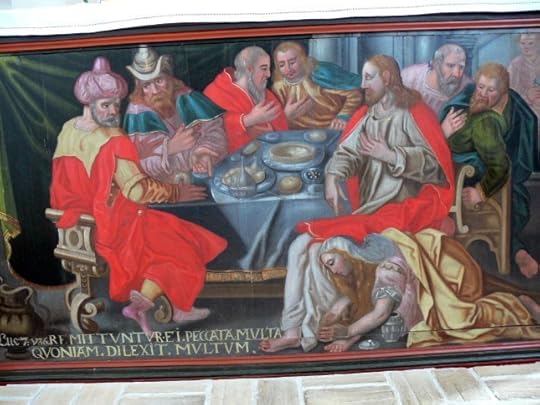 here: “we are simply assuming that those who have true faith are concerned to demonstrate their faith by works – they realize faith and works go hand and hand and make their confession believable. Those who don’t have true faith don’t have this concern, even if they were at one point baptized”.
here: “we are simply assuming that those who have true faith are concerned to demonstrate their faith by works – they realize faith and works go hand and hand and make their confession believable. Those who don’t have true faith don’t have this concern, even if they were at one point baptized”.
November 24, 2014
“The Plague of Sin” and “The Cure of a Living Physician”: Bad News and Good News from Blessed Doctor Luther

“The Great Physician at Work,” by F. Hofmann (c. 1890)
Original sin is not a quiescent thing, but a kind of continuous motion or entelechy, producing its own effects. It is not a quiescent quality, but a restless evil which labors day and night, even in those who sleep. We see it in nocturnal defilements. It is a restless animal, a beast which cannot stand still, yes, which must have its motions. This is simply the truth, original sin disturbs greatly. It moves man to avarice, disobedience, and other vices, even when he sleeps. For it always endeavors to move us away from God. That ulcerous plague of sin cannot stand together with justification. For that reason it always excites its own passions and its own tendencies.
We admit, then, that these motions of original sin are there, just as Paul says, “I see in my members another law at war with the law of my mind and making me captive” [Rom. 7:23], as lust for young women. These impulses are at times lighter, at times more serious, and they should be viewed as a kind of poison which drains continually and an ulcer which, the nearer it comes to health, the less poison it holds. Sin acts in that way and we ought to apply plasters until it lets up. This is our life, when the plaster has been applied, whenever the poison is halted, when it is not present, then it grows faint. Thus original sin is restless even in us, but since we are under the doctor, under Christ and live mindful of our illness, we shall be blessed. For that poison decreases more and more from day to day and we always wipe out, wash, and cleanse the poison, with the poison becoming less until it is totally extinguished by fire in the judgment.
In the meantime we endure the cure of a living physician, that is, of Christ. We hear the Word, pray, read. As much as we can, we recover through the Word. For we ought to pray daily, hear and meditate on the Word daily, attend the sacraments, and purge the poison and rottenness. Accordingly, we ought to use these means, so that we are purged, cleansed of the poison of sin, until we are truly and entirely purged. This takes place in the pit of the tomb, until we reach eternal life, which happens at the last judgment. This is also a very good argument.
(AE Vol. 34, Disputation Concerning Justification, 1536; Argument XX)
::
Therefore every Christian has enough in Baptism to learn and to practice all his life; for he has always enough to do to believe firmly what it promises and brings: victory over death and the devil, forgiveness of sin, the grace of God, the entire Christ, and the Holy Ghost with His gifts. In short, it is so transcendent that if timid nature could realize it, it might well doubt whether it could be true.
For consider, if there were somewhere a physician who understood the art of saving men from dying, or, even though they died, of restoring them speedily to life, so that they would thereafter live forever, how the world would pour in money like snow and rain, so that because of the throng of the rich no one could find access! But here in Baptism there is brought free to every one’s door such a treasure and medicine as utterly destroys death and preserves all men alive.
(Large Catechism Pars IV, “Of Baptism”, sec. 41-43)
+SDG+
Do you like what I write here at Just & Sinner?
Would you like to help me out with my ongoing seminary expenses?
Please visit my person website and take a look at
my seminary fund donations page. Thank you!
November 23, 2014
Fr. Jack Whritenour defines the term “Evangelical Catholic”
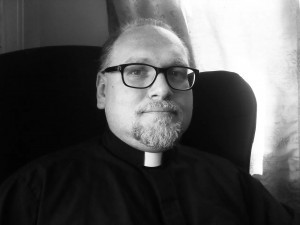
You don’t know Fr. Jack. Yet. Unless you do.
Fr. Jack Whritenour, stalwart conservative ELCA clergyman and administrator of the Society for the Preservation of the Evangelical Lutheran Liturgy on Facebook, defines the term “Evangelical Catholic”:
An Evangelical Catholic (and here I use the term as it applies to Lutherans) is one who views the Church of the Augsburg Confession as not just a Protestant denomination (or several denominations) but a branch of the one, holy, catholic, and apostolic Church of Jesus Christ, and sees Lutheranism as a reforming movement within the catholic Church. Carl Braaten has coined the phrase “catholics in exile.” Most of us believe that full communion with the See and Bishop of Rome is something for which we should pray and strive under the guidance of the Holy Spirit and in accordance with the high priestly prayer of our Lord Jesus Christ.
Evangelical Catholics, while obviously acknowledging the primary importance of the right preaching and teaching of the Holy Gospel, also place the sacraments of Baptism, Confession & Absolution, and the Lord’s Supper on the same level of importance as the right preaching of the Gospel for our faith and life as Christians. Evangelical Catholics, therefore, believe, as the Lutheran Confessions say, that the Lord’s Supper is celebrated every Lord’s Day and at other times (Holy Days). We adamantly defend the doctrine of the True Presence of our living Lord Jesus Christ in the bread and wine of His Holy Supper. We have a high view of ordination, believing that the ministry of the Apostles has been perpetuated in the Church down through the ages by those who have received the laying on of hands in ordination (by those who themselves have been ordained) and who have been called by the Holy Spirit through the Church to this Holy Office. We value the historic liturgy of the Church—her rites, prayers, ceremonies, vestments, ornaments, sacred art, and sacred music—which we consider treasures of the Church which should be used and carefully guarded against the heresy of iconoclasm. We reject only those ceremonies, rites, practices, etc. that obscure the Gospel, but we receive everything from the Great Tradition that is in accordance with the Gospel and is helpful in the proclamation of the Gospel.
Finally, let me say that the Evangelical Catholicism is not a party within Lutheranism; it IS Lutheranism. In truth “Evangelical Catholic” is a redundancy; for we believe that to be evangelical is to be catholic and to be catholic is to be evangelical.
(Nota Bene: in the original text of Fr. Jack’s comments “Evangelical Catholic” and its derivatives were not capitalized. I made the choice to capitalize them here—just so you know where to lob the verbal tomatoes. Again, lob them at me, not him. I have my reasons, the foremost of which is grammatical: “Evangelical Catholic” is used as a proper noun; thus it should be capitalized. Secondly, I will not cede the adjective “catholic” or the capital “C” to the Church of Rome. I do not accept the dissolution of language which has led to the eponymous use of the term “Catholic” for “communicant member of the Church of Rome.” Furthermore, we would all do well to remember that the antonym of the term “Catholic” is not “Protestant” but “sectarian.” Context should determine the use of the term so as to avoid confusion, yes; however, all I ask is that we as Lutherans acknowledge that there are contexts which would bid us proclaim “We are Western Catholic Christians,” even perhaps even simply, “We are Catholics.” This is a matter of in statu confessionis. No parallax of time and no devolution of language can ever tie the term “Catholic” exclusively to the Roman see. Words shape our thinking. Ideas have consequences. Lex orandi lex credendi. –TDD)
+SDG+
November 22, 2014
“Who’s right, St. Paul or St. James?” The Formula of Concord on faith and its fruit.

Kretzmann says it was James the Less. If he’s wrong…oh, well.
When people try to undermine justification sola fide as it is taught in Romans with James chapter 2, all of the explanation you need can be found in the Formula of Concord, Article III.
The question answered by James 2:20 is not “How is a man justified?” but rather “How do you see that a man is justified?” And the answer is: the same way you see that a tree is good. If someone is a Christian, you will see the effects (good works), and thus be able to induce the cause (faith). And relax! This recognition is a gospel thing, not a law thing—like predestination.
Now, if you simply see someone’s good works, you cannot for that reason alone conclude that he is a Christian. Why not? Because without the confession of faith in Christ, “good works” are not the fruit of faith, but of the opinio legis, flowing from either fear or Pharisaism.
With that said, it is always a genuinely uplifting experience to suspect that someone is a Christian because of their kindness (cf. Galatians 5:22-23), and then learn that your suspicion was correct. Dostoevsky talks about the “physiognomy” of a man revealing something of his soul. It’s certainly not a science, nor is it really even an art; i.e., there’s no way to get from “I was delighted to learn that my co-worker is indeed a Christian, as I suspected!” to “I’m a certified fruit inspector.” No; rather, it is an unlooked-for blessing when you recognize a brother or sister in Christ whom you had never met before. It’s a mystery, a bit of je ne sais quoi. But when it does happen, it certainly does warm the heart.
+ + +
Formula of Concord, Solid Declaration, Art. III: “Of The Righteousness of Faith before God”, 42-43
42] Many disputations also are usefully and well explained by means of this true distinction, of which the Apology treats in reference to the passage James 2:20. For when we speak of faith, how it justifies, the doctrine of St. Paul is that faith alone, without works, justifies (Romans 3:28), inasmuch as it applies and appropriates to us the merit of Christ, as has been said. But if the question is, wherein and whereby a Christian can perceive and distinguish, either in himself or in others, a true living faith from a feigned and dead faith, (since many idle, secure Christians imagine for themselves a delusion in place of faith, while they nevertheless have no true faith), the Apology gives this answer: James calls that dead faith where good works and fruits of the Spirit of every kind do not follow. And to this effect the Latin edition of the Apology says:
Iacobus recte negat, nos tali fide iustificari, quae est sine operibus, hoc est, quae mortua est.
That is: “St. James teaches correctly when he denies that we are justified by such a faith as is without works, which is dead faith.”
43] But James speaks, as the Apology says, concerning the works of those who have already been
justified through Christ, reconciled with God, and obtained forgiveness of sins through Christ. But if the question is, whereby and whence faith has this, and what appertains to this that it justifies and saves, it is false and incorrect to say:
Fidem non posse iustificare sine operibus; vel fidem, quatenus caritatem, qua formatur, coniunctam habet, iustificare; vel fidei, ut iustificet, necessariam esse praesentiam bonorum operum; vel bona opera esse causam sine qua non, quae per particulas exclusivas ex articulo iustificationis non excludantur.
That is: That faith cannot justify without works; or that faith justifies or makes righteous, inasmuch as it has love with it, for the sake of which love this is ascribed to faith [it has love with it, by which it is formed]; or that the presence of works with faith is necessary if otherwise man is to be justified thereby before God; or that the presence of good works in the article of justification, or for justification, is needful, so that good works are a cause without which man cannot be justified, and that they are not excluded from the article of justification by the particulae exclusivae: absque operibus etc., that is, when St. Paul says: “without works.” For faith makes righteous only inasmuch as and because, as a means and instrument, it lays hold of, and accepts, the grace of God and the merit of Christ in the promise of the Gospel.
+SDG+
Did you like what you read here?
Would you consider supporting me
with my ongoing seminary expenses?
Please click here to take a look at my
seminary fund donations page. Thank you!
November 21, 2014
Not Radical Enough – the Problem with Radical Lutherans like Gerhard Forde
“Without [faith in Christ], the law always accuses us” — Philip Melanchthon, 16th century Lutheran confessor.
“For the desires of the flesh are against the Spirit, and the desires of the Spirit are against the flesh, for these are opposed to each other, to keep you from doing the things you want to do. “ — Galatians 5:17I’ve been doing a bunch of posts about “The Third Use of the Law”. Here is what we might call part I and part II. This would be part III.
A couple years ago, on Gene Veith’s blog, I came across this fine quote from the man who carries the torch of the Father of Radical Lutheranism, Gerhard Forde – the ELCA Lutheran theologian Steven D. Paulson. From the following, you can get a sense of what is appealing – and right! – about the “Radical Lutheran’s” outlook:
`I forgive you’… Luther taught and demonstrated that these simple words give absolute, indubitable certainty, and no one is more dangerous than a person who is certain. The certainty was not based on human self-certainty; it was the opposite of that. It was the certainty of forgiveness because of what the Son of God did by taking the sins of the world upon himself and defeating them at the cross… (p. 7)
Amen to that! But he then goes on to say:
“…The decisive cosmic battle of God against sin, death, and devil was already waged and won when Christ was raised from the dead to make a new kingdom of people who live with no law, have nowhere to go, and nothing to accomplish. They were simply–free.” (7)
When I first wrote a piece on this called Dangerous children: to the world or to the word? a few years ago – in a post the Lutheran pastor Paul McCain was kind enough to pick up and re-publish – (see here and here) I said this: “I believe that we as God’s children are free indeed – to play and otherwise, but does this strike you as somehow a bit off?”
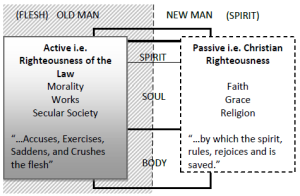
For more explanation see here.
It is. The problem – other than the fact that it presents a more “theologically-liberal-friendly” and “hi-jack-able” view of Lutheranism* – is that it really ignores the concrete realities of the two natures of the Christian: the old man and the new man, each with their own separate – and battling – wills. The old, unredeemed will, infected by sin as well as the will of the new creature in Christ, ever looking to Christ for all things – pardon, power, sanctification, etc.
Battling wills – what can it mean? Two natures in the Christian?** This is quite radical stuff! Who can understand it? How can our reason – or even the categories provided by philosophy – begin to accurately capture this divinely revealed reality? And yet, in order that we might understand our situation as we must – and receive the corresponding medicine and help from God that we need – it is critical that we pay attention to the vivid and concrete language of the Scriptures.
Just like the Scriptures, I am particularly keen to see how all of this plays out on the ground, in our Christian lives (we rightly love Romans 7 but dare not isolate it from its wider context!). I agree that the law can accuse while it instructs – or even that it can accuse while it is delighted in! – but then what happens when it comes to the Christian’s action? What next really? Of course in the midst of real life, we do not focus on God’s law and gospel in an abstract manner – or at least should not. It is meant to not only accuse, but to be obeyed, period.
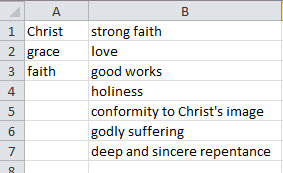
A = justification ; B = sanctification. Thanks for the illustration Dr. Rosenbladt.
I think the issue is that as regards the doctrine of justification (always to be kept separate in column A!) we go to the simul: 100% sinner and 100% saint. In order to give certainty to those with terrified consciences, this doctrine is particularly critical. On the other hand, as regards our active sanctification (which can be distinguished from the passive sanctification which accompanies justification in time), we go to the partim: we are partially sinner and partially saint, and the saint part in us is to increase in this life. Here, we are talking about how there is really, somehow, a changed nature and will in the believer and this thing the FC calls the “inchoate righteousness” (see SD III, 23 and 32 – its like the two natures of Christ where there are two wills!) – and the battle is on… (to see more of this in Luther’s Galatians commentary, see what Trent Demarest has posted here).
In my recent posts about Jack Kilcrease’s view of the third use of the law, I think the problems of theologies influenced by Forde – where the partim is, in effect, made irrelevant to the discussion – become ever more clear. Dr. Kilcrease goes so far as to say that:
“In all fairness to Forde… certain interpretations of the third use of the law made since the Reformation have described it as non-threatening and even pleasant. If Forde means to take aims at those formulations, then, in light of the confessional understanding of the law, he is certainly correct to do so.” http://www.ctsfw.net/media/pdfs/KilcreaseFordesDoctrineOfTheLaw.pdf
(Jack Kilcrease, “Gerhard’s Forde’s Doctrine of the Law: A Confessional Lutheran Critique,” Concordia Theological Quarterly Volume 75:1-2 (2011): 174, bold mine).

Pastor Bill Cwirla: “You can only say you’re weak on sanctification if you view sanctification as your work.” Not necessarily… (see conversation here)
On the contrary, he certainly is not. Sin decreases in maturing Christians as, driven by Christ and His Spirit, they eagerly seek the means of grace and strive in – not by – God’s Law. They may not detect progress themselves (I John) – instead becoming ever more aware of their sin (I John 3:19-24 – whew!) But at the same time their love for God’s law and its truth, goodness, and pleasantness nonetheless increases – along with, importantly, their thankfulness to Christ for fulfilling it in His life and death, silencing its threats against the sin that will remain until death (because, as Pastor Weedon reminds us, on the death bed, Satan will attempt to “play the tape” and get us to end in despair).
There is indeed something new in the Christian that, by nature, cooperates with the Holy Spirit of God in doing good. While old Adam needs to be kept in check and dragged along in good works, the “new man” is not only passive in receiving God’s gifts but actively delights in the beauty of God’s law and delights in doing it as well. This is why Martin Chemnitz, in the FC II makes a distinction between the state of man’s will before regeneration and after. FC VI distinguishes between the regenerated part of man and the unregenerated part of man.
Again, this is the partim which Radical Lutheranism feels no need to substantially address. Not radical enough, it cannot bear what seems to be like a duality of nature, a duality of substance, a duality of essence, a duality of being… what we might call today a dual “ontological reality”… Note that modern and “respectable” thinkers shun both substances and “dualisms” whenever possible.***

“Make duty a pleasure”.
So the Law always accuses… But. Yes, I said “but”. Christian maturity demands that we say more.
Philip Melanchton did say more (in Ap. IV, 167). In the Apology of the Augsburg Confession for example, here is what he says:
When this keeping of the law and obedience to the law is perfect, it is indeed righteousness; but in us it is weak and impure. Therefore it does not please God for its own sake, and it is not acceptable for its own sake. From what we have said it is clear that justification does not mean merely the beginning of our renewal, but the reconciliation by which we are later accepted. Nevertheless, it is more clearly evident now that this incipient keeping of the law does not justify, because it is accepted only on account of faith. We must not trust that we are accounted righteous before God by our own perfection and keeping of the law, but only because of Christ. … All the Scriptures and the church proclaim that the law cannot be satisfied. The incipient keeping of the law does not please God for its own sake, but for the sake of faith in Christ. Without this, the law always accuses us. For who loves or fears God enough? Who endures patiently enough the afflictions that God sends? Who does not often wonder whether history is governed by God’s counsels or by chance? Who does not often doubt whether God hears him? Who does not often complain because the wicked have better luck than the devout, because the wicked persecute the devout? Who lives up to the requirements of his calling? Who loves his neighbor as himself? Who is not tempted by lust? (Ap. IV, 160-161, 166-167)
Read those italicized and bolded remarks a few times over.
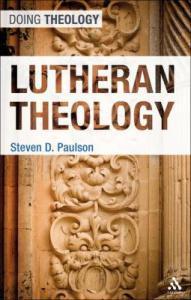
Not radical enough.
We recognize that we, the baptized, have been forgiven in Christ and continue to be forgiven in Christ – and this gives us the motivation to call on the Holy Spirit, Christ’s Spirit, for power and strength as we seek to drive out our old Adam and his sin more and more. How? Through seeking out the means of grace and living by the full counsel of God, which means in part, living in, not by, the Law.
Luther is very clear on this exact matter – none of our current confusion would have caught him off guard. In this case, at least, there is nothing new under the sun.
“On account of the Old Adam we are also baptized for repentance. We must constantly repent; we must constantly mortify our flesh. That is, we must continually mend our evil ways and be cleansed and at the same time always hope for that forgiveness that we now have. When we are baptized and believe in Christ, we do all this…. Christ wants to say: ‘I baptize and call you to repentance. But at the same time I confer on you the spiritual fire, that is, the Holy Spirit, so that you live under the forgiveness of sins, repenting daily and purging and cleansing the evil flesh, which strives against the Spirit’” (LW, 22, 179-180).
And…
“[The Lord’s Supper]…nourishes and strengthens the new creature…[it] is given as a daily food and sustenance so that our faith may be refreshed and strengthened and that it may not succumb in the struggle but become stronger and stronger. For the new life should be one that continually develops and progresses. But it has to suffer a great deal of opposition…” (LC, Part V)
FIN
*To not have expectations of a person certainly could sound like love to the world – especially today’s world – but insofar as we are new creations in Christ we certainly know that this is actually rather disinterest, lack of concern, and lack of love.
**“The reason why seemingly contradictory statements are often made in the Bible about Christians is due to the Christians two-fold nature. The simple fact is that within each Christian two natures constantly oppose each other. “The flesh wars against the spirit and the spirit wars against the flesh” (Gal. 5:17) — end of chapter 1 of “On Christian freedom”
***a notable exception is this quote from Hans Ulrich Bumbrecht, professor of Romance languages at Stanford University, from his 2004 book “Production of Presence: What Meaning Cannot Convey”:
What I want to say….is that there is probably no way to end the exclusive dominance of interpretation, to abandon hermeneutics… in the humanities without using concepts that potential intellectual opponents may polemically characterize as “substantialist,” that is concepts such as “substance” itself, “presence,” and perhaps even “reality” and “Being”. To use such concepts, however, has long been a symptom of despicably bad intellectual taste in the humanities; indeed, to believe in the possibility of referring to the world other than by meaning has become anonymous with the utmost degree of philosophical naivete – and until recently, few humanists have been courageous enough to deliberately draw such potentially devastating and embarrassing criticism upon themselves. We all know only too well that saying whatever it takes to confute the charge of being “substantialist” is the humanities on autopilot (bold mine, quoted in Armin Wenz, Biblical Hermeneutics in a Postmodern World: Sacramental Hermeneutics versus Spiritualistic Constructivism, LOGIA, 2013)
As I noted in the past: “In other words, almost no one today in the academic world is a “substantialist”, or we might say “essentialist” – to suggest that there are things in the cosmos that have firm categories of being, or essence, or substance, is anathema, for the universe is in flux. To suggest that some of these things have an objective meaning or purpose we can discern takes even greater hutzpa. Now, it is likely that some in the fields of the humanities see what has become their arch-nemesis, science, as being “essentialist”, however one notes the primacy (and difficulty) of interpretation in the modern sciences as well: to speak of essences is to speak of atomic particles, and not things we regularly see and experience in the cosmos, like males and females, and marriages and children, for example. More importantly, the particles and assemblies of particles might “mean something” in a purely material sense – showing themselves to have a certain order and predictability – but a greater purpose in those things that contain them can only be a total mystery (I talked about the despair this creates here).”
Here, perhaps we should think about the English in the Small Catechism (“What does this mean?”) as opposed to the German (“What is this?”).
If we don’t treat the work that Christ does in us to produce a new nature with a new will with a new righteousness as a real in the Christian, is there, literally, any substance to what we are talking about? How would this not be more appealing to persons who would like to, on the concrete ground, change the church’s moral teachings?
November 20, 2014
“God the Father, Son, and Holy Spirit, who is the eternal and essential righteousness, dwells by faith in the elect…”
 The following quote is taken from a comment by Rev. Dr. Holger Sonntag from an ongoing conversation over at Brothers of John the Steadfast.
The following quote is taken from a comment by Rev. Dr. Holger Sonntag from an ongoing conversation over at Brothers of John the Steadfast.
+ + +
We believe based on the Bible that Christ’s gifts are not separated from Christ, the Giver of those gifts. Accordingly, our confessions reject as false the teaching “that not God himself but only divine gifts dwell in believers” (Formula of Concord, Epitome III, 18), but affirm the correct teaching: “it is true indeed that God the Father, Son, and Holy Spirit, who is the eternal and essential righteousness, dwells by faith in the elect who have been justified through Christ and reconciled with God, since all Christians are temples of God the Father, Son, and Holy Spirit, who impels them to do rightly” (Formula of Concord, Solid Decl. III, 54).
In other words, God doesn’t give like we do, so that his gifts become separated from him; he always gives himself with the gifts. So, where the gifts are, there Christ is. Therefore, when the Small Catechism speaks of Christ’s gifts to us (in the Creed, Baptism, Absolution, the Lord’s Supper) — forgiveness, life, and salvation — then you may safely assume that these gifts don’t come without the presence of Christ, our crucified Savior, himself.
I think this an exceedingly comforting aspect of the gospel: Christ, our divine-human Savior — not far from us, with his human nature locked up in some far-away heaven, but right here with us under our cross to comfort and strengthen and lead us with his good Spirit, dwelling in our hearts by faith (Eph. 3:17).
Here’s how Luther put it in his commentary on the Small Catechism, the Large Catechism (LC II, 67-68):
Now you see that the Creed is a very different teaching from the Ten Commandments. The latter teach us what we ought to do; the Creed tells us what God does for us and gives to us. The Ten Commandments, moreover, are inscribed in the hearts of all men. No human wisdom can comprehend the Creed; it must be taught by the Holy Spirit alone. 68 Therefore the Ten Commandments do not by themselves make us Christians, for God’s wrath and displeasure still remain on us because we cannot fulfill his demands. But the Creed brings pure grace and makes us upright and pleasing to God. 69 Through this knowledge we come to love and delight in all the commandments of God because we see that God gives himself completely to us, with all his gifts and his power, to help us keep the Ten Commandments: the Father gives us all creation, Christ all his works, the Holy Spirit all his gifts.
Specifically on the Holy Spirit’s present work of sanctification in us, there’s this nice quote in the Large Catechism, quite fitting for the end of the church year with its focus on Christ’s return in glory (LC II, 57-59):
Meanwhile, since holiness has begun and is growing daily, we await the time when our flesh will be put to death, will be buried with all its uncleanness, and will come forth gloriously and arise to complete and perfect holiness in a new, eternal life. 58 Now we are only halfway pure and holy. The Holy Spirit must continue to work in us through the Word, daily granting forgiveness until we attain to that life where there will be no more forgiveness. In that life are only perfectly pure and holy people, full of goodness and righteousness, completely freed from sin, death, and all evil, living in new, immortal and glorified bodies.
59 All this, then, is the office and work of the Holy Spirit, to begin and daily to increase holiness on earth through these two means, the Christian church and the forgiveness of sins. Then, when we pass from this life, he will instantly perfect our holiness and will eternally preserve us in it by means of the last two parts of this article.
Who wouldn’t want to believe this great biblical teaching—the holy Trinity himself right now dwelling in us poor sinners with all his gifts, to forgive us all our sins and in just this way helping us to increase daily in holiness in this life according to the law in which we now delight, and to grant us perfect holiness in the life of the world to come where we will need no more forgiveness? (emphasis mine—TDD)
So, in other words, while the exact term “mystical union” appears neither in the Small nor in the Large Catechism (or any of the other confessions), it’s clear that the thing meant by the term—the Holy Trinity himself mysteriously dwelling in us by grace and making us partakers of the divine nature and all its wondrous spiritual blessings by faith (2 Peter 1:4, see also Solid Decl. VIII, 34: “St. Peter testifies with clear words that even we, in whom Christ dwells only by grace, have in Christ, because of this exalted mystery [of the incarnation], ‘become partakers of the divine nature’ (2 Pet. 1:4)”)—is taught in many places.
We should all, as believers in Christ, rejoice in this great comforting doctrine.
+SDG+
Please also take the opportunity to purchase this gem of Lutheran theology, Only the Decalogue is Eternal: Martin Luther’s Complete Antinomian Theses and Disputations, also translated by Dr. Sonntag. This book is a rich (and perennially relevant!) work of pastoral theology—some of Luther’s very finest, in the opinion of this humble layman.
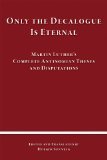
See larger image
Only the Decalogue is Eternal (Perfect Paperback)
By (author): Martin Luther
Martin Luther's Complete Antinomian Theses & Disputations.
Why the Antinomian disputations? Why now? Whether it is the disappearance of the last generation of native-German speaking Americans, a residual post-World War II anti-German bias, or simply neglect, the theology of Luther that made its way out of the 16th century seems to have devolved, at least in the United States, into simple caricature. If known at all, Lutheran theology seems simply to be that which bolsters or buttresses contemporary theological concepts, ideas and trends...By bringing an unknown work of Luther to light, once again the reader is forced to consider the greater question of his theology in toto.
This 224 page work presents Luther's Antinomian Theses & Disputations in English for the very first time, and is a must-have for anyone interested in Lutheran theology.
List Price:
$15.99 USD
New From:
$13.30 USD In Stock
Used from:
$38.88 USD In Stock

Francis Pieper: “The Necessity of Sanctification and Good Works” and “The Imperfection of Sanctification”

Click on Franz to buy his book.
From Christian Dogmatics, Vol. III, (CPH, St. Louis: 2011) pp. 20-37
The Necessity of Sanctification and Good Works
The dispute about the necessity of good works was in part simply a logomachy, the words “necessity” and “free” lending themselves to different meanings. Formula of Concord: “This controversy was originally occasioned by the words necessitas and libertas, that is, necessary and free, because especially the word necessitas, necessary, signifies not only the eternal immutable order according to which all men are obliged and in duty bound to obey God, but sometimes also a coercion, by which the Law forces men to good works” (Trigl. , ). But in part basic doctrinal differences occasioned the strife. In the words of the Formula of Concord: “But afterwards there was a disputation not only concerning the words, but the doctrine itself was attacked in the most violent manner, and it was contended that the new obedience in the regenerate is not necessary because of the above-mentioned divine order” (, ibid., ). The Fourth Article of the Formula of Concord is directed against the errors and incautious statements on this point that had disturbed the peace of the Lutheran Church. 24
Scripture teaches that sanctification and good works are not necessary for salvation. It teaches that faith obtains not only the remission of sins, but also salvation without the works of the Law, entirely irrespective of sanctification and good works. The Formula of Concord, quoting Romans 4:6 and Ephesians 2:8, declares: “We believe, teach, and confess also that good works should be entirely excluded, just as well in the question concerning salvation as in the article of justification before God, as the apostle testifies with clear words, when he writes as follows: ‘Even as David also describeth the blessedness of the man unto whom God imputeth righteousness without works, saying, Blessed is the man to whom the Lord will not impute sin,’ Romans 4:6 ff. And again: ‘By grace are ye saved through faith; and that not of yourselves, it is the gift of God; not of works, lest any man should boast,’ Ephesians 2:8-9.” (Trigl. , .) Luther: “Where there is forgiveness of sins, there is also life and salvation.”
But also the modified form of Majorism, which holds that good works are necessary not to obtain salvation, but in order to retain salvation, is contrary to Scripture. The texts quoted declare that faith from its very beginning is in full possession of salvation. The assumption that it is the business of the works to preserve salvation for the believer would create the queer situation that, in the words of the Formula, “faith only in the beginning lays hold of righteousness and salvation and then resigns its office to the works as though thereafter they had to sustain faith, the righteousness received, and salvation” (Trigl. , ). Faith as the means of salvation would be deposed! But “St. Paul, Romans 5:2, ascribes to faith not only the entrance to grace, but also that we are in grace and boast of the future glory, that is, the beginning, middle, and end he ascribes all to faith alone. Likewise, Romans 11:20: ‘Because of unbelief they were broken off, and thou standest by faith.’ Colossians 1:22: ‘He will present you holy and unblamable and unreprovable in His sight if ye continue in the faith.’ 1 Petet 1:5, 9: ‘By the power of God we are kept through faith unto salvation.’ Likewise, ‘Receiving the end of your faith, even the salvation of your souls.’ ” (Ibid.) In short, Major, Menius, and the others directly contradict Scripture when they speak of the necessity of good works whether for the obtaining or for the retaining of salvation.
What Major and his adherents really meant by asserting that good works are necessary for salvation was that good works are necessary for the preservation of faith. It was this Semi-Pelagianism or synergism which lay at the bottom of Majorism.25 Synergism, which holds that conversion, the kindling of faith, is brought about by the proper human conduct, by refraining from willful resistance, will also teach that good works or the abstention from evil works are necessary to preserve faith. It has been correctly pointed out, in the past and also in recent times, that George Major did not invent the theory that good works are necessary for salvation. Already in 1536 and even earlier Melanchthon, the father of synergism in the Lutheran Church, had insisted that good works are necessary for salvation.26 On account of Luther’s strong opposition he refrained for a time from reiterating such a statement, but he again made it in his later writings, particularly in the Leipzig Interim: “It is certainly true that these virtues, faith, love, hope, and others must be in us and are necessary to salvation.” That Major was swayed by synergistic considerations becomes particularly evident from his chief argument: “No one is saved by evil works.”27 He was ensnared by the synergistic paralogism: Since evil works entail the loss of faith and consequently the loss of salvation, it must also be said that good works are necessary for the preservation of faith and, consequently, of salvation. This paralogism had also been enunciated by Melanchthon in his Loci of 1543. Frank: “Among the reasons why good works are necessary the Loci list ‘the necessity of retaining the faith’ and offer as proof: ‘since the Holy Spirit is expelled and grieved when a man sins against his conscience’ ” (Theol. der F. C., II, p. 151).28
Scripture, however, clearly distinguishes between the relation of evil works and of good works to the Christian’s state of faith. Scriptural teaching on this point may be summarized thus: Evil works destroy faith, but good works do not preserve faith.
Scripture teaches most distinctly that evil works destroy faith. 1 Timothy 1:18-20 and 2 Timothy 2:16-18 state that those who by evil actions thrust aside their conscience have made shipwreck concerning their faith. 1 Corinthians 6, 9 ff. warns: “Be not deceived: neither fornicators, nor idolaters, nor adulterers, nor effeminate, nor abusers of themselves with mankind, nor thieves, nor covetous, nor drunkards, nor revilers, nor extortioners shall inherit the kingdom of God.” Galatians 5:21, Ephesians 5:5, Romans 8:13, Colossians 3:6, make the same statement. Quoting these passages, the Lutheran Confessions declare: “The false Epicurean delusion is to be earnestly censured and rejected, namely, that some imagine that faith and the righteousness and salvation which they have received can be lost through no sins or wicked deed, not even through willful and intentional ones” (Trigl. , ). Faith cannot endure in the heart which is given to sin because, as Scripture so plainly tells us, the Holy Spirit, who is the causa efficiens of faith, is grieved by evil works and will finally depart from the heart. Hence the earnest admonition of Scripture: “Grieve not the Holy Spirit of God, whereby ye are sealed unto the day of redemption” (Ephesians 4:30). The Holy Spirit is not only “the Spirit of faith” (2 Corinthians 4:13),29 but also the Spirit of sanctification and good works.30 He incessantly admonishes and urges believers to avoid the evil and perform the good.31 And if the Holy Ghost is persistently thwarted in this part of His work, He will cease to perform the other part, the preservation of faith. The Christian Church has always taught that evil works destroy faith.
On the other hand, we dare not say that good works preserve faith. True, good works, being effected through faith by the power of the Holy Spirit, assure Christians of their faith, of their state of grace (tesimonium externum Spiritus Sancti de fide et statu gratiae), and for this reason Christians should show all diligence in good works.32 But to say that good works preserve faith and thereby assure Christians of the final salvation, turns everything that Scripture says of the relation of faith to good works upside down. Good works do not sustain faith, but, conversely, faith sustains good works. It cannot be otherwise, since good works, according to Scripture, are in every case only the effect, fruit, and consequence of faith. (See the chapter on “The Relation of Justification to Sanctification.”)
It seems incredible that the proposition that good works preserve faith should ever have arisen within the Lutheran Church. Major and his associates were guilty of a glaring self-contradiction when they contended both that good works are solely the fruit and effect of faith and that faith is sustained by good works. They might as well have said that the fruits sustain the tree instead of the reverse. Majorism would make sense only if it were not true that good works are the fruit and result of faith, only if good works were placed ahead of faith. Majorism belongs in the Semi-Pelagianistic-synergistic camp, in the Roman camp. The Formula of Concord puts it there: “The decree of the Council of Trent, and whatever elsewhere is set forth in the same sense, is justly to be rejected, namely, that our good works preserve salvation, or that the righteousness of faith which has been received, or even faith itself, is either entirely or in part kept and preserved by our works” (Trigl. , ). Without any further ado all should admit that Majorism reproduces the Catholic doctrine.
Any attempted defense of Majorism flouts logic and contradicts the Scripture doctrine of justification. Some theologians of our day have sought to extenuate the error of Major by pointing to his good intention, namely, “to stress the necessity of the renewal and good works which grow out of faith.”33 There is absolutely no logical connection between “the necessity of the renewal and good works which grow out of faith” and the assertion that good works sustain faith. On the contrary, as surely as renewal and good works are only fruits of faith, so surely they do not sustain faith, but are sustained by faith. Furthermore, what does Majorism do to the doctrine of justification? If good works sustain faith and thus preserve salvation, faith is no longer the sole means of obtaining salvation, but good works take their place beside faith as the means of obtaining salvation, yea, they take the place of faith. Then man no longer obtains salvation by faith minus works, but by faith plus works. And that is exactly the Papistic doctrine of the fides caritate formata. In the words of Luthardt, Major’s teaching “bases the continuance of the communion with God on both faith and the new obedience” (Dogmatik, p.321; Luthardt-Jelke, p. 424). Thomasius himself reaches the same conclusion. According to the propositions of Major and Menius, “The salvation of man still rests on two factors: God’s work of grace through Christ for us and the work of the Spirit in us, the trust in the former and the obedience toward the latter. Faith does not, in the course of the Christian life, entirely surrender its position of chief importance to sanctification, but it does share it with sanctification, and thus after all loses it.” (Op. cit., p. 108.)
Again, in order to extenuate Majorism, it has been urged that Majorism was far from ascribing any merit to the good works in the obtaining of salvation. Major himself made much of this point.34 It is the same kind of deception which is practiced with regard to conversion and justification. We are told that conversion does not depend on the facultas se applicandi ad gratiam, the right conduct, etc., as a merit, but as a conditio sine qua non. Likewise, in justification the works are said to be required not as a merit, but as that without which justification cannot come about: Praesentia bonorum operum ad iustificationem necessaria est. We have shown that this is simply a juggling with words (Vol. II, p. 482 f.; 534 f.). They will not call it a merit, but ascribe to it the effect of merit, namely, “that through this trifling thing_we obtain righteousness and grace” (Luther, St. L. II:580). And that is precisely what is wrong with Major’s statement that good works, while they do not merit salvation, are nevertheless necessary for salvation. One who believes this assertion will not look to the Gospel, which promises salvation “without the deeds of the Law,” but will look about for the good works which supposedly are necessary for salvation; he will, in fact, base his salvation on works; he will seek his salvation in the Law. The Formula of Concord emphatically calls attention to this deception. It rejects as “modes of speech that should not be taught, defended, or excused” such statements as the following: “We should not indeed rest faith upon the merit of works, but we must nevertheless have them as things necessary to salvation.” Again: “Although we require works as necessary to salvation, yet we do not teach to place trust in works.” (Trigl. , .) In short, Majorism belongs in the Romish camp. The content of this teaching is Papistic, and the effect on the assurance of justification and salvation is Papistic. If good works are necessary to preserve faith and salvation, “they [these propositions] take from afflicted, troubled consciences the comfort of the Gospel, give occasion for doubt, are in many ways dangerous, strengthen presumption in one’s own righteousness and confidence in one’s own works” (Ibid., ).35
Majorism to this day seeks cover behind Hebrews 12:14: “Follow peace with all men and holiness, without which no man shall see the Lord.” But, in the first place, true sanctification presupposes the faith which already possesses salvation (Ephesians 2:8: “By grace are ye saved through faith.” John 5:24). Because we already have heaven, we lead a holy life (Colossians 3:1 ff.; 2 Corinthians 7:1). Possessing the treasures of heaven, we turn from the refuse of earthly things. And, in the second place, this passage, as the context shows, warns against carnal security and thus is part of the Law. Because Christians are inclined to carnal security and forget sanctification, these words: “Without holiness no man shall see the Lord” are also directed to them; for the very next words are: “Looking diligently lest any man fail of the grace of God; lest any root of bitterness springing up trouble you and thereby many be defiled; lest there be any fornicator or profane person, as Esau, who for one morsel of meat sold his birthright.” In short, it is clear that these words belong to the preaching of the Law, and it is just as clear that these words have no place in answering the question how the sinner, condemned to hell by the Law, appropriates and keeps God’s grace and eternal salvation. That is done by faith without the works of the Law, without the works enumerated Hebrews 12:14-16. Here, as Luther often reminds us, one must entirely forget all about the Law and its demands. Also Heb. 12:14-16, like all other passages demanding good works, belongs to the Law (sunt phrases legales), is directed against carnal security (contra fucatam fidem), and must be kept out of the doctrine of justification and the attainment of salvation.
In defending their position Major and Menius mixed Law and Gospel in still another way. They claimed that though the statement concerning the necessity of good works for salvation does not apply in the sphere of justification, it is true in the sphere of the obedientia of the new man.36 That will never do. The new obedience is fulfillment of the Law (Romans 13:8-10). But since the obtaining of salvation is in no wise dependent on our fulfillment of the Law, it will never do to say that the new obedience is necessary for salvation.
In opposition to Major’s claim, Nicholas of Amsdorf asserted that good works are detrimental and injurious to salvation.37 What he originally meant to say was that to trust in good works for justification and salvation is injurious. Formula of Concord: “If anyone should wish to drag good works into the article of justification, or rest his righteousness or trust for salvation upon them, to merit God’s grace and be saved by them, to this not we say, but St. Paul himself says, and repeats it three times, Philippians 3:7 ff., that to such a man his works are not only useless and a hindrance, but also injurious” (Ibid., ). But the Formula of Concord then rejects the fiat statement that good works are injurious to salvation. We are not “to say simpliciter and flatly: good works are injurious to believers for or as regards their salvation.” They are to be performed with all diligence because 1) they are a “token” (ἔνδειξις) of salvation, Philippians 1:28, 2) they are “God’s will and command,” and 3) God “promises a glorious reward in this life and in the life to come.” Therefore, says the Confession, the proposition that good works are injurious to salvation is to be avoided as false and offensive; it impairs discipline and decency (Trigl. , ibid., .).
Concluding this section, we take note of the offer made by Major in 1558 that “in order not to give anyone a cause for further contention he would no longer employ the words ‘good works are necessary for salvation,’ because they are liable to be misunderstood.”38 However, this statement must be avoided not because it is liable to be misunderstood, but because it is wrong in itself. The Formula of Concord was right in rejecting the proposition outright: good works are not necessary to obtain nor to preserve salvation, not to procure nor to preserve faith. There is only one cure for Major’s proposition, and that is to strike out the words “for salvation.” It must be made to read: “Good works are necessary.” Majorism can be cured only by eliminating it.
“Sanctification and good works are necessary.” This statement, too, has been violently assailed. But it must stand as a statement of Scripture. Scripture calls the obedience rendered to the government a “necessity” (ἀνάγκη, Romans 13:5); it declares that we “must” (δεῖ) obey God rather than men (Acts 5:29). The fact that Scriptural terms, such as “necessity” and “must,” have been misused by false teachers to hide their error must not induce us to criticize and reject the Scriptural terms. That would be a criticism of the Holy Ghost. The Holy Ghost always uses exact language.
When Scripture speaks of the necessity of good works, it means that we must perform them. It is the clear teaching of Scripture that God has commanded them (necessitas voluntatis et praecepti sive mandati divini). We read: “This is the will of God, even your sanctification,” 1 Thessalonians 4:3. “This is His commandment that we should … love one another, as He gave us commandment,” 1 John 3:23. God commands Christians to lead a holy life 1) on His account. He does not want His children to serve sin and Satan. He wants them to serve Him, their rightful Lord, who has created them and then clearly purchased them by the blood of His Son. He redeemed them for this very purpose that they should lead a holy life. Titus 2:12-14: “Christ gave Himself for us that He might redeem us from all iniquity and purify unto Himself a peculiar people, zealous of good works.” Ephesians 2:10: “We are His workmanship (ποίημα), created in Christ Jesus to good works.”39 2) Christians should perform good works on their own account. Sanctification and good works are to be for Christians the external testimony (testimonium Spiritus Sancti externum) of their state of grace and their possession of salvation. 1 John 3:14: “We know that we have passed from death unto life, because we love the brethren.”40 3) Christians live a holy life on account of the world. By their holy life they should prove the truth of the Gospel to the unbelievers and thus induce them to hear the saving Word.1 Peter 2:12: “Having your conversation honest among the Gentiles,” etc. 1 Peter 3:1–2: Husbands should be won without the Word “by the conversation of the wives.” Matthew 5:13-16: “Salt of the earth, light of the world.”
This necessity, however, does not imply coercion, compulsion (necessitas coactionis); it is a necessity which is coupled with willingness, since Christians according to their new man gladly and willingly do the will of God. Romans 7:22: “I delight in the Law of God after the inward man.” The necessity which arises from God’s will, precept, and command and the willingness on the part of the Christian go together, because the Gospel has written the Law, i.e., the will, precept, and command of God into the heart of the Christian (Jer. 31:31 ff.). He performs his duty willingly.41 The Antinomians would not tolerate the use of the terms “necessary” and “must” because of their mistaken notion that these terms always imply coercion.42
On the other hand, the terms “willingness,” “free,” etc., have been subjected to criticism. Yet Scripture itself uses these terms in settingforth that good works are done without the coercion of the Law. Ps. 110:3: “Thy people shall be willing in the day of Thy power”; 2 Cor. 9:7: “Every man as he purposeth in his heart, not grudgingly or of necessity” (there is to be no compulsion about it); 1 Pet. 5:2: “Not by constraint, but willingly.” No man in his right senses will get the impression that Scripture leaves it to the discretion of the individual whether he will or will not do good works.43
The Imperfection of Sanctification
While justification is always perfect, admitting of no degrees, our sanctification in this life will remain imperfect, sometimes showing a minus, sometimes a plus, but never reaching perfection. Scripture admonishes us to grow, increase, abound, in sanctification, Eph. 4:15; in every good work, 2 Cor. 9:8; in the work of the Lord, 1 Cor. 15:58; in the knowledge of God, in all patience and long-suffering, Col. 1:11; in the love of the brethren and of all men, 1 Thess. 3:12; in the knowledge of what is excellent, Phil. 1:10; in doing what pleases God, 1 Thess. 4:1; and couples these admonitions to grow in holiness with the admonition to keep on putting off the old man, Eph. 4:22. It is clear that the sanctification of even the most earnest Christians remains imperfect in this life.44 The σάρξ remains in Christians throughout this life, Rom. 7:14–24; Heb. 12:1, 45 and for this reason their sanctification remains imperfect throughout this life. Paul describes the situation in these words: “So, then, with the mind” (the new man) “I myself serve the Law of God, but with the flesh” (the old man) “the law of sin,” Rom. 7:25.46 The dogmaticians express it thus: Iustitia fidei sive imputata perfecta sive consummata est, iustitia vitae sive inhaerens imperfecta, inchoata, non consummata. (Baier-Walther, III, 312.)47
Perfectionism, which teaches that complete sanctification is attainable in this life,48 cannot dwell in the Christian heart, which daily asks for the forgiveness of sin. Rome goes so far as to teach that certain individuals merit more holiness than they need for themselves, the surplus going to those who need it.49 Scripture denounces perfectionism as a lie. 1 John 1:8, 10: “If we say that we have no sin, we deceive ourselves and the truth is not in us.… If we say that we have not sinned, we make Him a liar and His word is not in us.” See also Prov. 20:9; Job 14:4; Eccl. 7:20; Rom. 7:18–24; Matt. 6:12. 1 John 3:9: “Whosoever is born of God doth not commit sin; for His seed remaineth in him”—the favorite prooftext for perfectionism—describes the Christian according to the new man who maintains the dominion over the old man. The Apostle distinguishes between “committing sin” (ἁμαρτίαν ποιεῖν, 1 John 3:9) and “having sin” (ἁμαρτίαν ἔχειν, 1 John 1:8). Christians do not “commit sin,” that is, they do not permit sin to rule over them, to give it free reign; they “have sin,” but in the power of the new man, the offspring of God, they control sin. Speaking of the same matter, Rom. 6:14 declares: “Sin shall have no dominion over you; for ye are not under the Law, but under grace.”
The fact that sanctification in this life will always be imperfect must not be put forward as an excuse for the neglect of sanctification. On the contrary, it is God’s will and the will of the Christian that he strive after perfection;50 he wants to be fruitful, not only in some, but in all good works.51 It is characteristic of the true Christian life and the will of the new man that he refrain from every sin. The Christian is eager to serve God in all good works. “I delight in the Law of God after the inward man,” Rom. 7:22. And when Scripture calls Christians “perfect” also with regard to their life (“Let us, therefore, as many as be perfect,” Phil. 3:15), it takes “perfection” in the sense of “striving after perfection,”Phil. 3:13–14: “Forgetting these things that are behind and reaching forth unto those things that are before, I press toward the mark.”52
The Christian who does not strive to serve God alone is perilously close to losing his Christianity. “Ye cannot serve God and mammon,”Matt. 6:24; “So likewise, whosoever he be of you that forsaketh not all that he hath, he cannot be My disciple,” Luke 14:33 (the entire passage, Luke 14:25–35, belongs here). Unsparing self-denial marks the Christian life. “If any man will come after Me, let him deny himself and take up his cross and follow Me,” Matt. 16:24. The way to heaven leads through “the strait gate” and the “narrow way,” Matt. 7:13–14. Only he can go this way who is willing to cut off his hand and foot and pluck out his eye, Matt. 18:8–9. The Apostle Paul describes the Christian as one who exercises self-control in all things, πάντα ἐγκρατεύεται, 1 Cor. 9:25, and points to himself as an example: “I keep under” (ὑπωπιάζω—buffet, maul) “my body and bring it into subjection, lest that by any means, when I have preached to others, I myself should be a castaway,” 1 Cor. 9:27.53
In view of the Scriptural requirement of perfect sanctification, the Christian will ask: “Who, then, can be saved?” Christ tells him: “With men this is impossible, but with God all things are possible,” Matt. 19:25–26. Nothing makes Christians so conscious of their daily deficiencies as the earnest striving for perfection. And when they acknowledge and confess their daily shortcomings before God, they flee for refuge to divine grace, knowing that the grace of God takes no account of the Law and human works, of our daily success or failure in sanctification and good works. Only by keeping Law and Gospel separate could the Apostle, on the one hand, be fully assured of grace and salvation, Rom. 8:37–39, and, on the other hand, require unsparing self-denial, 1 Cor. 9:27. The whole life of the Christian thus becomes a daily repentance. The more sincerely Christians daily endeavor to rid themselves of all they have and to serve God alone in all their works, the better they learn to know the abysmal sinful depravity which clings to them, and the more earnestly they will daily implore the free grace of God in Christ. And since they are no more under the Law, but under grace (Rom. 6:14), they daily begin anew their struggle to attain perfect sanctification, deploring their many failures (“O wretched man that I am! Who shall deliver me from the body of this death?”), but, at the same time, being assured of their ultimate victory (“I thank God through Jesus Christ, our Lord,” Rom. 7:24–25). Striving after perfect sanctification, the Christian thus leads a life of daily repentance (poenitentia quotidiana, poenitentia stantium).
Which is the greater evil, perfectionism or indifference to sanctification? A. J. Gordon says: “If the doctrine of sinless perfection is heresy, the doctrine of contentment with sinful imperfection is a greater heresy.… It is not an edifying spectacle to see a Christian worldling throwing stones at a Christian perfectionist.” (See Strong, Syst. Theol., p. 881.) It is useless to discuss the question which of these two “heresies” is the greater. The Bible says to the “Christian worldling”: “This ye know that no whoremonger, nor unclean person, nor covetous man, who is an idolater, hath any inheritance in the kingdom of Christ and of God. Let no man deceive you with vain words; for because of these things cometh the wrath of God upon the children of disobedience. Be not ye therefore partakers with them.” (Eph. 5:5–7.) And to the perfectionists the Bible says: “If we say that we have no sin, we deceive ourselves, and the truth is not in us.” Again, in still stronger language: “If we say that we have not sinned, we make Him a liar and His word is not in us.” (1 John 1:8,10.)54 If perfectionists such as Wesley retained their faith, this was due to the fact that for their own persons they did not believe their doctrine.
In the treatise An Argument in Defense of All the Articles of Dr. Martin Luther Condemned in the Roman Bull Luther, following Augustine, insisted: “A pious man sins in all his good works,” and: “The very best work is a venial sin according to God’s merciful judgment, and a mortal sin according to His strict judgment.” (St. L. XV:1551, 1554.) Later the Council of Trent repeated the Pope’s condemnation of this statement of Luther,55 which overthrows the foundation of Roman work-righteousness and of the whole Papacy. It is clear that if Christians stand in need of the forgiveness of sins for their good works because of the imperfection clinging to them, they cannot merit the forgiveness of sins by these works. What Luther says in establishing the article which the Pope had condemned is a complete refutation both of Papistic and of “Protestant” perfectionism. Luther writes:
This article (a pious man sins in all his good works) is obnoxious to the work-saints, who place their reliance not upon God’s mercy, but on their own righteousness, that is, on sand (Matt. 7:26 f.). But a pious Christian should learn and know that all his good works avail nothing in the sight of God; with all the dear saints he should despair of his own works and rely on the pure mercy of God with all confidence and firm trust. Let us see what the dear saints say about it. Isaiah (64:6) says: ‘We are all of us unclean, and all our righteousness is like a filthy, stinking rag.’ Observe that the Prophet excepts nobody; he says, ‘we are all of us unclean,’ and he was a holy Prophet. Again, he says, ‘all righteousness,’ none excepted. If, then, there is such a thing as a good work, without sin, this Prophet is lying, which God forbid. Is not this passage of Isaiah clear enough? Why, then, do they condemn my article, which states nothing but what this Prophet states? But we shall gladly stand condemned with the holy Prophet. Furthermore, Solomon says (Eccl. 7:20): ‘There is no man on earth so righteous that he doeth a good work and sinneth not.’ I think this passage covers everything; it states, nearly word for word, what my article states. Well, Solomon here stands condemned. And his father David is in like condemnation. He says in Ps. 143:2: ‘Lord, enter not into judgment with me, Thy servant, for in Thy sight shall no man living be justified.’ Who is God’s servant but he who does good works? How, then, does it happen that he cannot endure God’s judgment? Surely God’s judgment is not unjust. If a work, then, were altogether good and without sin, it need not flee God’s just judgment; the fault must necessarily lie in the work, which is impure. Therefore no man living is justified in God’s sight, but all men need His mercy, even when they do good. Here you Papists should exhibit your skill, not by simply fabricating bulls, but by answering these passages. I have already shown, in the first two articles, that all the saints struggle against their sinful flesh and are sinners as long as they live in the flesh, which warreth against the spirit; therefore at one and the same time they serve God according to the spirit and sin according to the flesh. If, then, a righteous man is at the same time justified by reason of the spirit and sinful by reason of the flesh, the work must certainly be as the person, the fruit as the tree. Inasmuch as it is a work of the spirit, it is good; inasmuch as it is a work of the flesh, it is evil.… If they say, as they are wont to say, ‘Yes, but this uncleanness is not sin, but rather an imperfection, or weakness, or defect,’ I answer, It is indeed a defect and weakness, but if that be not sin, then I will say that murder and adultery are not sins, but defects and weaknesses. Who has given you Papists authority thus to tear up God’s Word and to call the impurity of a good work weakness and not sin? Where is there a single letter of Scripture for that? Must we believe your poor dreams without Scripture and you will not believe our plain Scripture?… If David says (Ps. 143:2) that even God’s servants cannot endure His judgment and no man living is justified in His sight, then this defect must certainly be sin.… Again, St. Augustine says in his Confessions (): ‘Woe unto all human life, though it were most laudable, if it were judged without mercy.’ Behold the great heretic St. Augustine speaking against this holy bull so impudently and wickedly that he attributes sin not only to a good life, but even condemns the very best life (which is made up of good works), if judged without mercy, as though it were nothing but mortal sin. O St. Augustine, dost thou not fear the most holy father Pope? Gregory, too, speaks of the holy man Job thus: ‘The holy man Job saw that all our good works are nothing but sin if God judge them; he says (Job 9:3): “If anyone will contend with God, he cannot answer Him one of a thousand.” ’ What, you, too, Gregory? Dost thou dare to say that all our good works are nothing but sin? Thou art under the Pope’s ban and a heretic far worse than Luther. Luther says only that there is sin in all good works; thou makest them sin outright.… If these passages do not help my article, then may God help it! I had rather be condemned with Isaiah, David, Solomon, Paul, Augustine, and Gregory than be lauded with the Pope, and all bishops and Papists, though all the world were made up of Pope, Papists, and bishops. Blessed is he that must die for these things. XV, 1551 ff.
+SDG+
Get yourself a copy of Volume III of Pieper’s Christian Dogmatics! Or the whole set! Available on Kindle or hardcover from CPH and Amazon. You can also find a lot of used copies out there. Laymen and pastors alike should familiarize themselves with or refresh their knowledge of the work of this fine theologian.

See larger image
Christian Dogmatics: Volume 3 (Kindle Edition)
By (author): Francis Pieper
A translation of Christliche Dogmatik, Volume III addresses sanctification, good works, christian life, means of grace, law and gospel, baptism, Lord's Supper, Christian church, public ministry, eternal election, and eschatology.
Kindle Edition:
Check Amazon for Pricing Digital Only


![“Without [faith in Christ], the law always accuses us” -- Philip Melanchthon, 16th century Lutheran confessor.](https://i.gr-assets.com/images/S/compressed.photo.goodreads.com/hostedimages/1417805006i/12551073.jpg)


